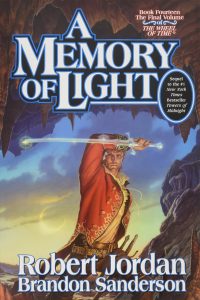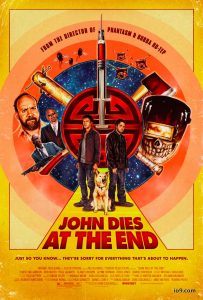 For the past twenty years, which it to say, about as long as it takes to grow a human, I have been reading the Wheel of Time. For the past nine months, which is to say, about as long as it takes to gestate a human, I have been reading nothing except[1] the Wheel of Time. As of sometime shortly after I finish this review, those days have ended, I guess. It’s pretty hard to think past that, so far.
For the past twenty years, which it to say, about as long as it takes to grow a human, I have been reading the Wheel of Time. For the past nine months, which is to say, about as long as it takes to gestate a human, I have been reading nothing except[1] the Wheel of Time. As of sometime shortly after I finish this review, those days have ended, I guess. It’s pretty hard to think past that, so far.
This also marks the end of the Kindle experiment. After going more than eight months of just that little screen, I picked up and read a physical book again. And let’s not kid around, A Memory of Light is a monster of a book. So, how was the adjustment? It sucked having to find light in the dark instead of the light being built in right there. And it sucked having to lug around such a huge beast of a thing instead of a thin rectangle that fits in my pocket and holds more than enough books to choke a zorse. And, call me Luddite however you will, it was a relief to be turning pages and not having the words vanish mid-screen when I turned back to the open surface after a few minutes of distraction by work or whatever. I don’t know if it’s that the ritual act is subtly different and I missed it, or what. But I am quite sure I’m not finished with legacy paperbooks yet. (Not to worry, though, the Kindle is still 100% awesome for re-reads and Dresden Files paperbacks that have lately been manufactured using non-Euclidean geometries that hurt my brain.)
And there’s the story inside the book. See, I do not think there will be spoilers here, just sensory impressions. Nonetheless, I make no promises depending upon your sensitivity. Let’s see… First, I’m glad it was three books. The first two books could have been combined into one monster, but this deserved to be separate. It was not the same story, it was not the same stage of story, and although between them they probably did not need three entire books’ worth of pages to tell the last of what Jordan left behind, they probably did need two and a half.
I just had to delete half a paragraph (and an accompanying footnote!) when I realized that it was incredibly spoilerish in its implication. You probably don’t need to know that, but if the rest of this seems a little thin, that’s why. But, here’s what left of what I can say: A Memory of Light is a very apt book title. This is such a grim story. It should be; with terms like ‘the Last Battle’ and ‘the Dark One will break the Wheel of Time and remake it in his own image’ floating around, if your world isn’t on the brink of total destruction by the last book in your series, then you’ve been writing the previous books wrong. Anyway, my point is this. There were ways I might have hated the way the story ends (The Great Lord’s victory not being among them, and I’m not just saying that in an effort to avoid the appearance of spoilers[2]), but none of them came to pass. Which is to say, I can unreservedly recommend that people who have not made up their minds should go ahead and finish. There are a couple of bad parts to the story, but it is, taken as a whole, a solidly good story that I’m glad I read and that I do not think has let me down, not after either the nine months or the twenty years.
And, okay, one or two spoilers behind the cut.
[1] I mean, yes the internet, and yes some of the articles in Playboy. But no books, no comics, no graphic novels.
[2] Though I find that secondary outcome decidedly convenient!
Continue reading →
 For the past twenty years, which it to say, about as long as it takes to grow a human, I have been reading the Wheel of Time. For the past nine months, which is to say, about as long as it takes to gestate a human, I have been reading nothing except[1] the Wheel of Time. As of sometime shortly after I finish this review, those days have ended, I guess. It’s pretty hard to think past that, so far.
For the past twenty years, which it to say, about as long as it takes to grow a human, I have been reading the Wheel of Time. For the past nine months, which is to say, about as long as it takes to gestate a human, I have been reading nothing except[1] the Wheel of Time. As of sometime shortly after I finish this review, those days have ended, I guess. It’s pretty hard to think past that, so far. You guys. I am so embarrassed about this right now, and it’s going to be probably the worst review ever, but… I’m like four reviews behind, and at this point I can no longer separate out
You guys. I am so embarrassed about this right now, and it’s going to be probably the worst review ever, but… I’m like four reviews behind, and at this point I can no longer separate out